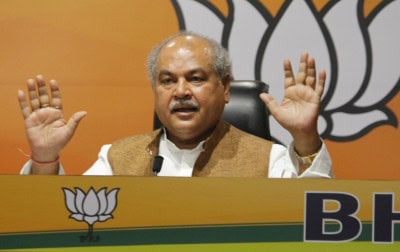By Pramod Kumar Jha
New Delhi, Sep 29 : Union Agriculture and Farmers Welfare Minister Narendra Singh Tomar has accused the Congress of misleading the farmers and playing politics in their name. He says that those who are opposing the new agricultural laws are pursuing their vested interests in the name of farmers.
Talking to IANS, the Agriculture Minister said that the two important bills related to agriculture are not being opposed by farmers, but the Congress is giving it political colour in pursuit of vested interests.
To a question on the cause of dispute of the law brought in to reform the agriculture sector, the Union Minister said: “The cause of the dispute is political and selfishness. Both Bills are beneficial for the farmers. Their standard of living is going to improve. Those who do not like this are opposing the bills and are trying to give them a political colour.
Three important legislations related to agriculture – the Farmers Produce Trade and Commerce (Promotion and Facilitation) Bill, 2020, the Farmers (Empowerment and Protection) Agreement on Price Assurance and Farm Services Bill, 2020, and the Essential Commodities (Amendment) Bill, 2020 were passed in the Monsoon Session of Parliament. After the President’s assent, all three have now become laws, but this hasn’t prevented farmers from opposing them.
Tomar, a minister in the Modi government that always talks about the interests of the village, the poor and the farmers, says that the new laws will bring prosperity to the lives of farmers.
Asked why in such a situation, have the farmers hit the streets to protest against the law? On this, Tomar outrightly rejected the involvement of farmers in the protests, saying that the protest is Congress-sponsored and only Congress members are involved in it. “The farmers are not on the streets anywhere. Congress is on the streets.”
Tomar has also been given additional charge of the Food Processing portfolio after Harsimrat Kaur Badal, from the BJP’s old ally Shiromani Akali Dal, resigned from the post in protest against the farm bills. In addition, he is already in-charge of the Ministry of Rural Development and the Ministry of Panchayati Raj.
Punjab and Haryana are witnessing the most intense protests against new agricultural laws. Asked the reason for this, Tomar said: “Wherever there is more selfishness when it comes to the mandis, there will be more opposition.”
So do the protests have more to do with the mandis than farmers? To this, Tomar clarified that neither the farmers nor the traders will be harmed by the new laws. He said that this is not an opposition to the market, but a protest that has brought the selfishness associated with the market out in the open. He said that Congress has a vested interest in it, so it is leading these protests.
Under the new law, there is no charge for the purchase of agricultural products in trade areas outside the mandis run by the Agricultural Produce Marketing Committee (APMC). Therefore, the law is raising fears about the existence of mandis operated by the APMC.
Noting that in Punjab, on the purchase of wheat and paddy, there is a mandi tax, RDF fee and agents’ commission, the Agriculture Minister argues that in case the processors buy directly from the farmers in the trade area, there will be no middlemen and no fee and the farmers will ultimately benefit.
Farmers in Punjab and Haryana are also apprehensive about purchase of their crops at the minimum support price (MSP). Responding to this, Tomar said that there should not be any dilemma in the minds of farmers about MSP. “The MSP will continue. We have declared the MSP of both Kharif and Rabi season crops and procurement process has started in the Kharif season.”
The government announces the MSP for 22 crops of Kharif and Rabi every year. Leaders of opposition parties and farmer organisations are questioning the absence of the MSP in the Bills. To this, the Union Agriculture Minister said that these Bills have nothing to do with the MSP.
On the demand for mandatory MSP, Tomar questioned the Congress as to why a law was not enacted during the last 50 years to make the MSP mandatory.
The lowest support price for wheat and paddy in the country was first decided in 1966-67. Tomar said that arrangements have been made for MSP in the country and the achievement of the Narendra Modi-led government is that by implementing the recommendations of the Swaminathan Commission, farmers get minimum support price every year with 50 per cent profit over cost of production. He said that when compared to previous governments, the procurement of crops from farmers on MSP has more than doubled during the tenure of the Modi government.
An RSS-affiliated farmers’ organisation has alleged that proposals and suggestions related to farmers were ignored in the Bills. On this, Tomar said: “Everyone has the right to suggest, but whatever deserves to be included in the law is included.”
Referring to the benefits to farmers, the Union Minister said that the law stipulates that farmers can now sell their produce anywhere in the country, on which there will be no tax and even the payment will be made within three days.
Responding to a question on the possibility of corporate interference from the law related to contract farming, the Union Agriculture Minister said that this law guarantees the value of the crop at the time of sowing and this was never done before. He said that the new farm law only provides for contracting the crop and there will be no contract on land.
Disclaimer: This story is auto-generated from IANS service.

